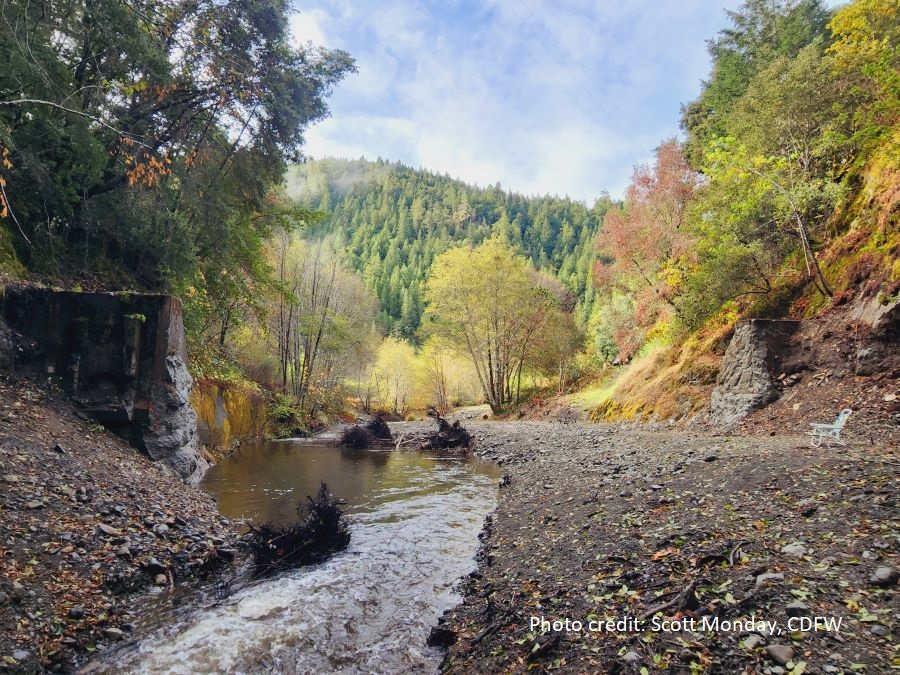CDFW Announces $22.5 Million Funding For Salmon Habitat Restoration
The following is courtesy of the California Department of Fish and Wildlife:

The California Department of Fish and Wildlife (CDFW) today announced the award of $22.5 million to 19 projects to support the restoration of critical habitat for salmon, climate resiliency, wildlife corridors and wetlands restoration.
“This initial round of awards represents a commitment to hit the ground running to support restoration and protection of our species, and I look forward to more announcements like this in the very near future,” said CDFW Director Charlton H. Bonham. “We must stand up as many new projects in a short period of time to make this critical habitat more resilient to the ever-changing climate.”
Protecting Salmon
CDFW has awarded more than $8.2 million to eight projects in watersheds throughout the state to address drought impacts for salmon in rivers and streams important to their lifecycle. Some projects will restore riparian habitat and fix unscreened water diversions. The largest project awarded under this round will be led by the Yurok Tribe within the Oregon Gulch section of the Upper Trinity River where remnants of hydraulic mining have narrowed the river and lead to a loss of salmon rearing habitat. This project will reestablish the natural flow of the river as well as a functioning floodplain to greatly improve habitat for salmon across various life stages.
Addressing Climate Impacts
Approximately $6.6 million was awarded to seven new projects to address urgent degrading water and habitat conditions due to climate change impacts. These projects include a focus on winter-run Chinook, improving the diversity of hatchery winter-run, as well as juvenile salmon collection system evaluation for re-introducing this species in the McCloud River above the Shasta Dam. Other projects will restore hydrologic function to floodplain habitat in the Sierra Nevada and monitor drought conditions for Chinook and coho salmon in the Scott River in Siskiyou County.
Wildlife Corridor – Fish Passage
Wildlife corridors are essential to providing fish and wildlife room to roam, or in this case, swim. CDFW awarded more than $6.5 million to three fish passage projects that will modify bridges and remove other barriers to fish passage in northern and central California.
Beavers, or Something Like Them
Approximately $1.2 million was awarded to Regents of UC Davis to work toward incorporating beaver dam analogs in the restoration of wetlands and mountain meadows.
Learn more about the awarded projects.
Next Steps
These projects will soon commence work. These awards are part of a new effort to support critical restoration statewide with $200 million in new funding for multi-benefit ecosystem restoration and protection projects under Drought, Climate and Nature Based Solutions Initiatives.
CDFW will announce additional awards throughout the month of March, with an emphasis on a strategic approach to rebuild salmon and other species by removing barriers to migration, improving water management and quality, restoring core salmon strongholds, taking substantial steps to modernize older infrastructure for salmon-friendly results, and other actions.
###
Background
This new funding for restoration and protection of critical habitat and watersheds statewide also supports key initiatives including conserving 30 percent of California’s lands and coastal waters by 2030 under California’s 30×30 initiative, Nature-Based Solutions, and increasing the pace and scale of restoration through Cutting Green Tape.
California must get more restoration done faster. To achieve that goal, CDFW has developed a single set of General Grant Program Guidelines with an overview of eligible project types, priorities, and information on the application process, available at www.wildlife.ca.gov/Conservation/Watersheds/Restoration-Grants/Concept-Application. Applications submitted under these new initiatives may also be considered for further evaluation under CDFW’s Proposition 1 and Proposition 68 Grant Programs, and a separate call for projects will also be released for these programs in early 2023.
More information about these funding opportunities, including guidelines and how to apply, general information about CDFW’s grant programs, as well as a schedule for upcoming grant solicitations, once available, can be found at www.wildlife.ca.gov/grants.



